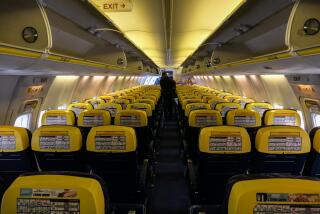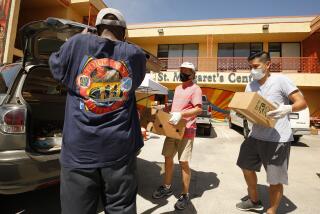A New Year’s Toast to Groups That Aid Travelers
As we enter the New Year, it’s fitting that we pay tribute to some members of the travel industry who toil for a gain beyond commercial considerations. I am thinking here of three organizations that deserve recognition.
Travelers Aid International, 1612 K St. NW, Washington, DC 20006; telephone (202) 546-1127, Internet https://www.travelersaid.org.
This is the long-familiar association (founded in 1851) of local affiliates that staff assistance desks in the nation’s 28 largest airports, 21 bus stations and nine train stations for people suffering emergencies while traveling--and they need not be indigent, either.
Example: An elderly French couple, speaking no English, visits Florida; he has a stroke and dies. She is utterly unable to cope until helped by Travelers Aid, which sends a French-speaking volunteer to handle a dozen necessary steps.
More frequently: A family on vacation is robbed of everything, and Travelers Aid steps in to see them safely home. If you’re in a station or terminal without a Travelers Aid desk, search the phone book for a local office.
Sprout, 893 Amsterdam Ave., New York, NY 10025; tel. (888) 222-9575, Internet https://www.gosprout.org.
Sprout operates small group tours from New York and Boston to popular destinations--Florida, Hawaii, Vermont, Acapulco and more--for mentally handicapped people of all ages. The only provisions are that travelers be ambulatory and of a moderate-to-high functioning level (i.e., without severe disabilities). They are accompanied on the trips not by teachers of special education, but by volunteers from all walks of life who share a passionate concern for the developmentally disabled.
Wilderness Inquiry, Box 84, 1313 Fifth St. SE, Minneapolis, MN 55414; tel. (612) 379-3858, Internet https://www.wildernessinquiry.org.
This outfit enables physically handicapped people, primarily those in wheelchairs, to enjoy challenging outdoor adventures (canoeing, trekking) by including them in expeditions undertaken by nondisabled people who volunteer for the trip.
These groups, half disabled, half not, embark on stimulating excursions of three to 30 days’ duration. The able-bodied lend a hand only when necessary, such as providing assistance getting into and out of boats.
I first wrote about these organizations 12 years ago, in a column that I’m essentially repeating today. I remain a humble admirer of their achievements.
More to Read
Sign up for The Wild
We’ll help you find the best places to hike, bike and run, as well as the perfect silent spots for meditation and yoga.
You may occasionally receive promotional content from the Los Angeles Times.






